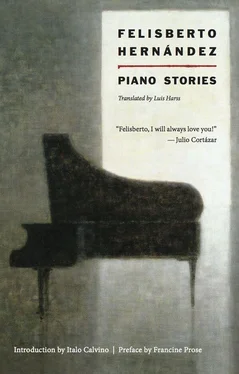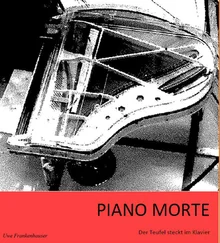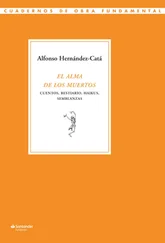Felisberto Hernandez - Piano Stories
Здесь есть возможность читать онлайн «Felisberto Hernandez - Piano Stories» весь текст электронной книги совершенно бесплатно (целиком полную версию без сокращений). В некоторых случаях можно слушать аудио, скачать через торрент в формате fb2 и присутствует краткое содержание. Год выпуска: 2014, Издательство: New Directions, Жанр: Современная проза, на английском языке. Описание произведения, (предисловие) а так же отзывы посетителей доступны на портале библиотеки ЛибКат.
- Название:Piano Stories
- Автор:
- Издательство:New Directions
- Жанр:
- Год:2014
- ISBN:нет данных
- Рейтинг книги:4 / 5. Голосов: 1
-
Избранное:Добавить в избранное
- Отзывы:
-
Ваша оценка:
- 80
- 1
- 2
- 3
- 4
- 5
Piano Stories: краткое содержание, описание и аннотация
Предлагаем к чтению аннотацию, описание, краткое содержание или предисловие (зависит от того, что написал сам автор книги «Piano Stories»). Если вы не нашли необходимую информацию о книге — напишите в комментариях, мы постараемся отыскать её.
Piano Stories
Piano Stories — читать онлайн бесплатно полную книгу (весь текст) целиком
Ниже представлен текст книги, разбитый по страницам. Система сохранения места последней прочитанной страницы, позволяет с удобством читать онлайн бесплатно книгу «Piano Stories», без необходимости каждый раз заново искать на чём Вы остановились. Поставьте закладку, и сможете в любой момент перейти на страницу, на которой закончили чтение.
Интервал:
Закладка:
The voice with which she summoned me over the phone the next morning sounded otherworldly. She said she was inviting me to a ceremony in honor of the water: it would take place that evening. Just before dark I heard the sound of pudding bowls and the quick patter of Mary’s steps and my fears were confirmed: I would have to attend Miss Margaret’s “wake.” She was waiting for me at the foot of the stairs. As the strokes of my oars backed us into the first room, I realized I had been hearing a murmur of water that now grew more intense. There was a sideboard in that room. The ripples spread by the boat made it bob up and down on its inner tubes, clinking glasses and rattling the chains that attached it to the wall. Across the room from it floated a sort of raft. It was rounded and held a table with chairs pulled up to it, inside a rail, like a gathering of deaf-mutes nodding slightly as the boat lapped by. My oars struck a doorframe on either side and we were in the bedroom. And there I saw it: water raining on water. All around the walls, except where there was furniture — the outsized wardrobe, the bed and the dresser — hung gushing showerheads of every shape and color, fed by thin rubber hoses that extended in garlands from a large glass container resembling a Turkish pipe suspended like a lamp from the ceiling. Through the grottolike atmosphere we pulled up to the bed, which stood fairly high out of the water on long glass legs. Miss Margaret took off her shoes and told me to do the same. She clambered up on the huge bed, facing the wall in back of it, where there was an equally huge picture of a bearded white goat standing on its hind legs. She grasped the picture, which swung open like a door, revealing a bathroom. Stepping on the mound of pillows, she hoisted herself through the opening, and returned a moment later carrying two round pudding bowls with candles stuck in them. She ordered me to set the bowls in the water and said there were more coming. As I got up on the bed next to her, I fell on my face. Although I straightened up at once, I had already smelled her perfume in the bedclothes. I was setting the bowls down over the edge of the bed as she handed them to me when suddenly she said: “Not like that, please — it reminds me of a wake” (and I realized Mary had been wrong). There were twenty-eight of them. She knelt on the bed, reached for the phone, which was on one of the night tables, and gave the order for the water to be cut off. In the tomblike silence that followed we began to light the candles, hanging over the foot of the bed, and I was careful not to get in her way. When we were nearly done she dropped the matchbox, which landed in one of the bowls. Leaving me where I was, she rolled over to strike the gong on the other night table. There was also a lamp on that table — the only source of light in the room. She had picked up the stick for sounding the gong when she changed her mind, left the stick by the lamp and half rose to shut the door that was a picture of a goat. Settling back down at the head of the bed, she began to rearrange the pillows, motioning me to strike the gong. Her legs took up so much space that I had to crawl on all fours around the edge of the bed to get to it, which wasn’t easy. I don’t know why, but I was afraid of falling into the water, although it was only two feet deep. I struck the gong once, and she indicated that this was enough. As I backed up along the bed — there was no room to turn around — I saw Miss Margaret lying face up under the picture of the goat, her eyes wide open, waiting. The pudding bowls also lay still in the water, like small boats resting at harbor before a storm. Almost as soon as the motors came on, the water started to roll and churn, and then Miss Margaret heaved herself off her pillows and plopped down on the foot of the bed next to me again. The current lashed by us, knocking the bowls together, rebounded off the far wall and came raging back at full speed to sweep the bowls away. One after another they overturned, the candles smoking a bit as they went out. I looked questioningly at Miss Margaret, but she was expecting my look and shielded her eyes from me with one hand. The bowls were sinking fast in the waves, swirling across the entrance hall and into the courtyard. As the candles fizzled out there were fewer reflections, and the spectacle lost its glow. When it seemed to be over, Miss Margaret, leaning on the elbow of the same arm that had provided the hand to shield her eyes, stuck out her other hand to release a last bowl caught under the bed. She watched it ride a swell for a second, but then it also went down. Slowly, she propped herself halfway up on her hands, as if to kneel or sit on her heels. With hanging head, her double chin sunk in the folds of her throat, she stared at the water like a little girl who has lost a doll. The motors were still running and she seemed more haggard and desolate every minute. Without waiting for instructions, I pulled in the boat, which was tied to a foot of the bed. I had barely climbed in and freed the rope when the current washed me away, a lot faster than I had anticipated. As it spun me around in the door to the entrance hall I looked back and saw Miss Margaret’s eyes riveted on me, as if I were one more pudding bowl still holding out the promise of some secret revelation. Now I was in the courtyard, going round and round the island. I sat in Miss Margaret’s armchair, letting the current take me where it pleased. I remembered the many times we had circled the island in the early days when Miss Margaret had seemed a different person to me, and fast as the current was, my thoughts began to drag me down into a bleak review of my life. I was fated to know only one side of people, and that only for a short time, like some absent-minded traveler passing through, with no idea of what he was seeing or where he was going. This time I had not even been able to figure out why I had been summoned by Miss Margaret to listen to her story without ever saying a word: all I knew for sure was that I would never really see into her. I went on circling the island with these thoughts spinning in my mind until the motors were turned off and Mary asked me for the boat so she could rescue the pudding bowls, which were going around in circles with me. I explained to her that there was no wake, that Miss Margaret simply liked to watch the bowls go down in flames. . and I didn’t know what else to say.
Later than usual, that same night, Miss Margaret summoned me again. She was nervous, and, without first clearing her throat, she took up her story at the point where she had bought the house and prepared it for flooding. Perhaps it had been cruel to displace the water in the fountain with all that dark earth. For a while, when the first plants were put in, the fountain had seemed to go on dreaming serenely of the water it used to hold. But since then the plants had kept growing into a tangle, like garbled messages, and she had to keep having them changed. She wanted the water to recall the silence of untroubled sleep or the murmuring voices of happy families (which was why she had told Mary she was deaf and could be reached only on the phone). She also wanted to drift over the water, slow as a cloud, holding books in her hands like harmless birds. But what she wanted most of all was to understand the water. “It may be,” she was telling me, “that it just wants to go its merry way, ignoring the suggestions it leaves behind. But, to my dying day, I’ll believe it’s harboring things it picked up in another place and somehow trying to bring me thoughts that aren’t mine but are meant for me. In any case, I’m happy near it, I try to understand it, and no one can stop me from preserving my memories in it.”
That night, contrary to habit, she gave me her hand as we parted. The next morning, when I went into the kitchen, the man in charge of the waterworks handed me a letter. Out of politeness — although all I could think of was getting away so I could read the letter — I asked him about his machines, and he said:
Читать дальшеИнтервал:
Закладка:
Похожие книги на «Piano Stories»
Представляем Вашему вниманию похожие книги на «Piano Stories» списком для выбора. Мы отобрали схожую по названию и смыслу литературу в надежде предоставить читателям больше вариантов отыскать новые, интересные, ещё непрочитанные произведения.
Обсуждение, отзывы о книге «Piano Stories» и просто собственные мнения читателей. Оставьте ваши комментарии, напишите, что Вы думаете о произведении, его смысле или главных героях. Укажите что конкретно понравилось, а что нет, и почему Вы так считаете.












